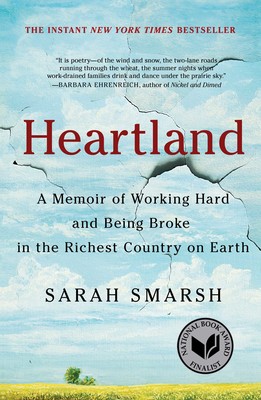Uncovering Poverty and Resilience in the Great Flyover
A Review of Heartland: A Memoir of Working Hard and Being Broke in the Richest Country on Earth by Sarah Smarsh (Scribner, 2018)
Cynthia Prescott, University of North Dakota
 As she tells it in Heartland, Sarah Smarsh “was born a fifth-generation Kansas farmer, roots so deep in the county where I was raised that I rode tractors on the same land where my ancestors rode wagons. (85)” But Smarsh is equally the product of generations of teenage mothers who drifted around different urban spaces—Wichita, Chicago, Denver, and many smaller towns in between—in their quest to better their lives and that of their children. Her grandmother moved more than 60 times in two decades, and her mother attended five different schools in different towns within one year. Smarsh bounced back and forth between rural and urban spaces as a child, moving 21 times before she finished high school. But for Smarsh, the transience of poverty was counterbalanced against her paternal line’s rootedness in the Kansas soil. As often as her family sought work and educational opportunities in Wichita, she remained grounded in rural life, always returning to her grandparents’ farm until her family finally lost the farm.
As she tells it in Heartland, Sarah Smarsh “was born a fifth-generation Kansas farmer, roots so deep in the county where I was raised that I rode tractors on the same land where my ancestors rode wagons. (85)” But Smarsh is equally the product of generations of teenage mothers who drifted around different urban spaces—Wichita, Chicago, Denver, and many smaller towns in between—in their quest to better their lives and that of their children. Her grandmother moved more than 60 times in two decades, and her mother attended five different schools in different towns within one year. Smarsh bounced back and forth between rural and urban spaces as a child, moving 21 times before she finished high school. But for Smarsh, the transience of poverty was counterbalanced against her paternal line’s rootedness in the Kansas soil. As often as her family sought work and educational opportunities in Wichita, she remained grounded in rural life, always returning to her grandparents’ farm until her family finally lost the farm.
I found this tension between transience and rootedness in the midst of the 1980s farm crisis to be one of the most revealing elements of Smarsh’s book. Too often, historians and social scientists treat “urban” and “rural” as mutually exclusive categories. We talk of in-migration and out-migration, urbanization and rural depopulation, as if they are one-way streets. Smarsh’s stories of moving back and forth between city and country, and of commuting or dividing time between town and farm, belie our overgeneralizations and highlight the interconnectedness of urban and rural places.
The subtitle describes Heartland as a memoir of hard work and poverty. Sarah Smarsh’s first book does recount her experiences growing up poor in America’s so-called heartland. But this book is so much more. The journalist and creative nonfiction writer powerfully interweaves family history and social commentary. She painstakingly reconstructed her parents’ and grandparents’ stories through archival and oral history research, which she intersperses with her own recollections throughout this volume. Moreover, she integrates nuanced analysis of social class identity and public policy with her retelling of her family’s stories, revealing how she and so many other Americans have become entrapped in poverty in “the richest country on earth.”
In Heartland, Smarsh eloquently unpacks the harsh realities of the working poor in places that are simultaneously celebrated as the nation’s “heartland” and mocked as being part of the “great flyover.” By portraying the realities of poverty in the midst of plenty and rural values in an increasingly urbanized nation, Sarah Smarsh offers a compelling picture of real life in places that too many Americans (think they) know only through caricature.
